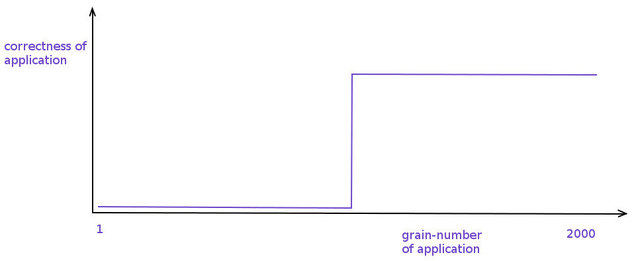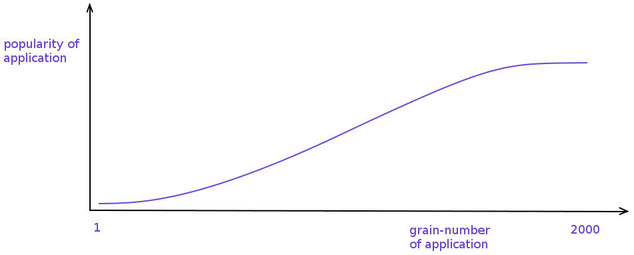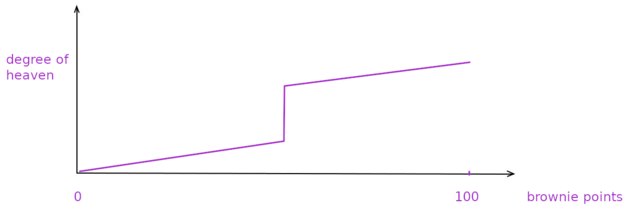-
 lish
9Ted Sider presents thiests with a paradox regarding hell and vagueness. He first presents 5 standard views about judgment and the afterlife. Here they are below.
lish
9Ted Sider presents thiests with a paradox regarding hell and vagueness. He first presents 5 standard views about judgment and the afterlife. Here they are below.
1. Dichotomy: there are exactly two states in the afterlife, heaven and hell.
2. Badness: people in hell are very, very much worse off than people in heaven.
3. Non-universality: some people go to heaven, and some to hell.
4. Divine Control: it is up to God who goes to heaven and who goes to hell.
5. Proportionality: justice is proportional, in the sense that it prohibits very unequal treatment of persons who are very similar in relevant respects. Treat similar cases similarly.
The paradox that these standards lead to is that God must pick a cutoff point at which two very similar people will be separated: one will be in heaven and the other in hell. In other words, if you take a person in hell who is the least deserving of hell and a person in heaven who is least deserving of heaven, they will be similar in relevant respects but receive incredibly different treatment. This is a violation of standard 5. To avoid this paradox, we must either deny 1-5 or propose a way in which God could justly divide people into heaven and hell.
I propose to defend God’s proportional justice by claiming there are degrees to heaven and hell. Here is the argument in standard form.
1. If there are degrees to heaven and hell, then people will go to the degree of heaven or hell that resembles their righteousness or lack of righteousness.
2. If people go to the degree of heaven or hell that resembles their righteousness or lack of righteousness, then God’s Justice is proportional.
3. There are degrees to heaven and hell.
4. People will go to the degree of heaven or hell that resembles their righteousness or lack of righteousness. (MP 1, 3)
5. Therefore, God’s Justice is proportional. (MP 2, 4)
This deals with the proportionality claim because people who are similar in relevant ways will have similar afterlives. There will still be a cut-off between heaven and hell, but the least deserving person of hell and the least deserving person of heaven will only differ minimally. Perhaps the person in hell will experience little to no suffering, while the person in heaven will experience little to no rewards. This proposal, however, slightly rejects the badness standard. The badness standard must merely be adjusted to say people in hell are worse off than people in heaven. It is necessary to remove the words “very” because sometimes it is only slightly. While this is a small bullet to bite, it is more satisfying than claiming God’s justice is not proportional. -
 bongo fury
1.8kWhile this is a small bullet to bite, — lish
bongo fury
1.8kWhile this is a small bullet to bite, — lish
It is? Then one wants to ask, is the location of the consequently fine line between least best heaven and least worst hell anywhere special? Or is it arbitrary?
Might you not as well say, hellishness and heavenliness are reciprocal terms ordering all individual afterlives into a line? All afterlives would be in heaven as well as hell in some degree: the most heavenly is simply the least hellish? "Everything is relative, and on a spectrum"? As in line [2] here:
[1] Tell me, do you think that a single grain of wheat is a heap?
[2] Well, certainly, it's the very smallest size of heap.
Game over. People often finish up claiming 2 had been their position all along. Perhaps it should have been, and the puzzle is a fraud. — bongo fury
Or would needing to place the very worst person into even the least grade of heaven be unacceptable, so that you would need to reserve some small corner of hell as heavenly in zero degree? Then your problem, potentially, is to identify a tipping point (e.g. between zero degree heavenly and non-zero degree heavenly) as I say. And then at least the game gets started...
https://thephilosophyforum.com/discussion/comment/562851
https://thephilosophyforum.com/discussion/comment/355842 -
 Agent Smith
9.5kWhat about net ethical points as commensurable by means of positive and negative valences assigned to one's deeds? So I might've done +3 good and -2 bad, giving me an net ethical point of +1 and I get my ticket to paradise. Someone else who has -9 bad and +3 good on his file would have a net ethical point of -6 and goes to jahanam.
Agent Smith
9.5kWhat about net ethical points as commensurable by means of positive and negative valences assigned to one's deeds? So I might've done +3 good and -2 bad, giving me an net ethical point of +1 and I get my ticket to paradise. Someone else who has -9 bad and +3 good on his file would have a net ethical point of -6 and goes to jahanam.
There 's no vagueness on this view. Every person will be reduced to net "charge" (positive/negative) and will be dealt accordingly. I wonder what happens to a person with a net ethical point of cipher/zero? -
 bongo fury
1.8kHi there, aka @TheMadFool.
bongo fury
1.8kHi there, aka @TheMadFool.
a net ethical point of +1 and I get my ticket to paradise. Someone else who has [...] a net ethical point of -6 and goes to jahanam. — Agent Smith
Your suggestion is described by this fourth graph,

from here, https://thephilosophyforum.com/discussion/comment/560730
(putting net ethical score horizontal and resulting degree of heaven vertical).
Whereas the OP appears to favour the second graph:

(with the same re-labelling).
I wonder what happens to a person with a net ethical point of cipher/zero? — Agent Smith
Are you switching to grades of hell/heaven after all? You might want some composite of the two graphs. Gradual increase interrupted by a sudden step change.

-
 unenlightened
10kI propose to defend God’s proportional justice by claiming there are degrees to heaven and hell. — lish
unenlightened
10kI propose to defend God’s proportional justice by claiming there are degrees to heaven and hell. — lish
I propose that nobody knows jack shit about the afterlife 'til they get there and then they do not share their knowledge with us.
Or, I propose that justice is heavenly, and injustice is hellish. Or that the afterlife is not reward and punishment, but this life is the reward or punishment for theafterprior-life. Or I propose that to get to heaven you have only to perform one unselfish act in a lifetime; unfortunately if you perform kind act to get to heaven, it is selfish. Thus the bar to heaven is set very low, and only a total shit goes to hell, but unfortunately nearly everyone is a total shit. Or... -
 Agent Smith
9.5k
Agent Smith
9.5k
Merci beaucoup monsieur/mademoiselle for the graphical representation of my stand on the issue. Indeed, when displayed as such, as a graph, my position "stands" ( :chin: ) on rather shaky ground. However, what if look at it this way: True, hell is a place of punishment, but that the penalty is proportionate to the offense. So, even if two people both are in hell, the intensity and duration of their suffering is determined by the net valence of their bad deeds (-1 suffers less than -8 in a manner of speaking). The long story short, hell isn't a one-size-fits-all kinda arrangement; au contraire, treatment, if you could call it that, is personalized. The same goes for jannat.
What sayest thou? -
 SpaceDweller
521
SpaceDweller
521
Problem is that heaven and hell is Christian belief but Sider presents it outside of that context. -
 baker
5.9kProblem is that heaven and hell is Christian belief but Sider presents it outside of that context. — SpaceDweller
baker
5.9kProblem is that heaven and hell is Christian belief but Sider presents it outside of that context. — SpaceDweller
Exactly. Makes one wonder why.
Within the monotheistic religious doctrines that contain the concept of eternal hell, there are also specified factors that lead to it. Here, for example, in the RCC.
Welcome to The Philosophy Forum!
Get involved in philosophical discussions about knowledge, truth, language, consciousness, science, politics, religion, logic and mathematics, art, history, and lots more. No ads, no clutter, and very little agreement — just fascinating conversations.
Categories
- Guest category
- Phil. Writing Challenge - June 2025
- The Lounge
- General Philosophy
- Metaphysics & Epistemology
- Philosophy of Mind
- Ethics
- Political Philosophy
- Philosophy of Art
- Logic & Philosophy of Mathematics
- Philosophy of Religion
- Philosophy of Science
- Philosophy of Language
- Interesting Stuff
- Politics and Current Affairs
- Humanities and Social Sciences
- Science and Technology
- Non-English Discussion
- German Discussion
- Spanish Discussion
- Learning Centre
- Resources
- Books and Papers
- Reading groups
- Questions
- Guest Speakers
- David Pearce
- Massimo Pigliucci
- Debates
- Debate Proposals
- Debate Discussion
- Feedback
- Article submissions
- About TPF
- Help
More Discussions
- Other sites we like
- Social media
- Terms of Service
- Sign In
- Created with PlushForums
- © 2026 The Philosophy Forum








